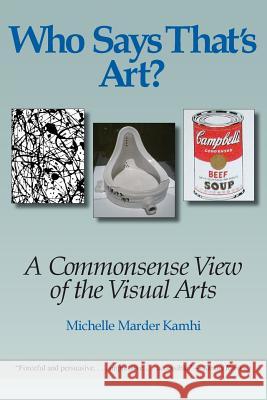Who Says That's Art?: A Commonsense View of the Visual Arts » książka
Who Says That's Art?: A Commonsense View of the Visual Arts
ISBN-13: 9780990605706 / Angielski / Miękka / 2014 / 336 str.
Today's artworld experts accept virtually anything as "art"--from all-black paintings and facsimiles of supermarket cartons to dead animals preserved in formaldehyde. Many art lovers reject such fabrications, however, arguing that they are not art. This book explains why those ordinary people are right and the presumed experts are wrong. Museums and galleries of contemporary art around the world are filled with "cutting-edge" pieces that art lovers largely detest, while painters and sculptors whose work the public would appreciate are ignored by the cultural establishment. How did this happen? What mistaken ideas have led to it? Who is responsible? And what can be done to reverse the situation? Who Says That's Art? answers such questions--in commonsense terms that non-specialists can readily understand. Many books have attempted to bridge the controversial gap between the public and the contemporary artworld. What makes this book different? Other writers claim that people need to know the theories behind "advanced" work in order to appreciate it. Who Says That's Art? debunks those theories. Moreover, it reveals the cultural forces that collude to promote pseudo art in the contemporary artworld--from art educators and wealthy collectors to museum administrators and the media. Drawing on evidence ranging from cognitive science to cross-cultural studies, the book explains how and why the traditional fine arts of painting and sculpture profoundly move us by embodying important human values. In contrast, it demonstrates the emptiness of the "installations" and "conceptual art" that dominate the postmodernist artworld. Further, it documents the shallowness of collectors who pay huge sums for notorious works of contemporary "art," such as a dead shark in a tank of formaldehyde. Surprisingly, however, the author--unlike most conservative critics--argues that the breakdown of the visual arts actually began with the invention of "abstract art" in the early twentieth century, because it rendered art unintelligible. In conclusion, Who Says That's Art? highlights the pleasures and rewards of genuine art, both old and new, and suggests how to restore sanity to the contemporary artworld. Kirkus Reviews calls the book "forceful and persuasive. . . . impressive." Midwest Book Review observes that "Kamhi's scrutiny is unerring. . . . providing non-specialists with a scholarly yet accessible account that not only explains how to distinguish genuine art but also promises to enhance its appreciation."
Todays artworld experts accept virtually anything as "art"--from all-black paintings and facsimiles of supermarket cartons to dead animals preserved in formaldehyde. Many art lovers reject such fabrications, however, arguing that they are not art. This book explains why those ordinary people are right and the presumed experts are wrong.Museums and galleries of contemporary art around the world are filled with "cutting-edge" pieces that art lovers largely detest, while painters and sculptors whose work the public would appreciate are ignored by the cultural establishment.How did this happen? What mistaken ideas have led to it? Who is responsible? And what can be done to reverse the situation? Who Says Thats Art? answers such questions--in commonsense terms that non-specialists can readily understand. Many books have attempted to bridge the controversial gap between the public and the contemporary artworld. What makes this book different? Other writers claim that people need to know the theories behind "advanced" work in order to appreciate it. Who Says Thats Art? debunks those theories. Moreover, it reveals the cultural forces that collude to promote pseudo art in the contemporary artworld--from art educators and wealthy collectors to museum administrators and the media.Drawing on evidence ranging from cognitive science to cross-cultural studies, the book explains how and why the traditional fine arts of painting and sculpture profoundly move us by embodying important human values. In contrast, it demonstrates the emptiness of the "installations" and "conceptual art" that dominate the postmodernist artworld. Further, it documents the shallowness of collectors who pay huge sums for notorious works of contemporary "art," such as a dead shark in a tank of formaldehyde. Surprisingly, however, the author--unlike most conservative critics--argues that the breakdown of the visual arts actually began with the invention of "abstract art" in the early twentieth century, because it rendered art unintelligible.In conclusion, Who Says Thats Art? highlights the pleasures and rewards of genuine art, both old and new, and suggests how to restore sanity to the contemporary artworld.Kirkus Reviews calls the book "forceful and persuasive. . . . impressive." Midwest Book Review observes that "Kamhis scrutiny is unerring. . . . providing non-specialists with a scholarly yet accessible account that not only explains how to distinguish genuine art but also promises to enhance its appreciation."











